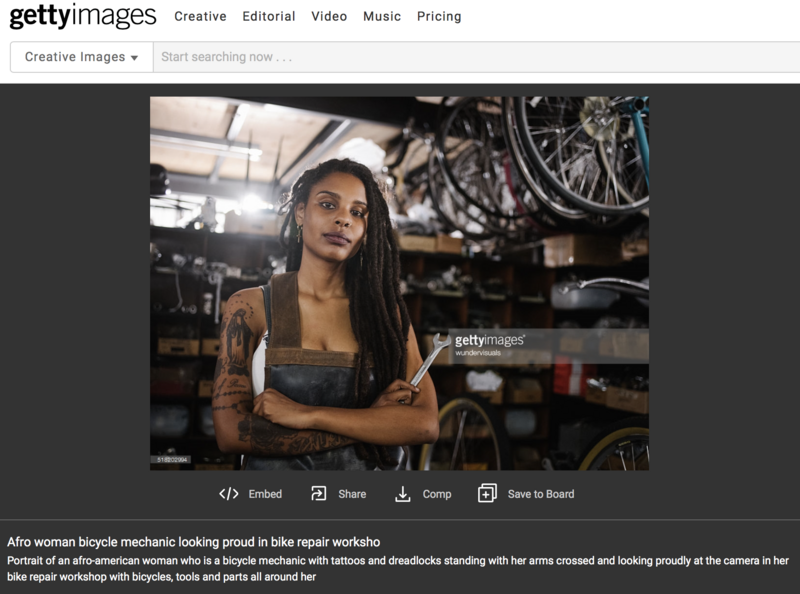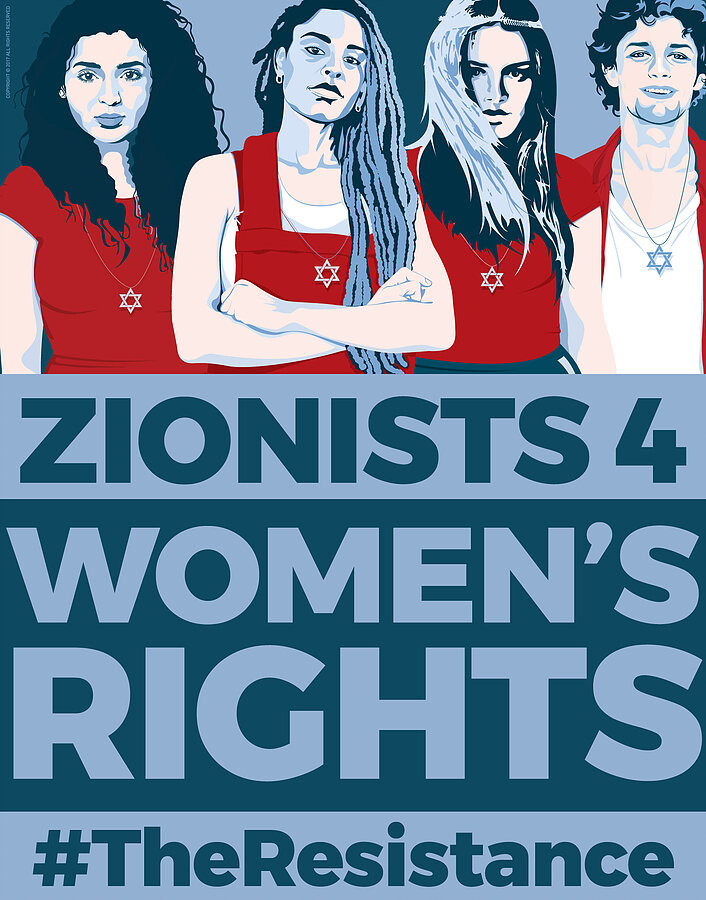Lobby Watch 22 January 2018

In a Getty Images database, South African hip hop artist Dope Saint Jude is misidentified as an “Afro-American woman” and her photo is sold as a generic stock image. Her image was altered by the pro-Israel “feminist” group Zioness, which erased her tattoo of Jesus and superimposed a Star of David on her chest.
A South African artist is rejecting any ties to a Zionist women’s group that is using her image in its propaganda.
Dope Saint Jude, a Cape Town hip hop artist and producer, confirmed that her image had been used by Zioness in posters and graphics promoting the pro-Israel group’s presence at the Women’s March in cities across the US last weekend.

A poster from the pro-Israel group Zioness.
One image, in a style reminiscent of Shepard Fairey’s famous poster of Barack Obama, shows Dope Saint Jude standing with arms crossed above the slogan “Zionists 4 Women’s Rights #TheResistance.”
Another includes the slogan “Zionesses stand with women in Iran.”
The Zioness movement appears to be an astroturfing effort to portray support for Israel as feminist, in line with the propaganda strategy adopted by Israel and its lobby groups to try to co-opt progressive support.
In a series of tweets, Dope Saint Jude – born Catherine St Jude Pretorius – confirmed that the image is of her.
“I am in no way affiliated with the Zioness movement,” she tweeted. “At all.”
“I’m just a South African girl who rides a motorbike, makes music and has no ties to Israel or the zionest [her spelling] movement,” she added.
The stylized image of Dope Saint Jude is adapted from a photo distributed by the Getty Images agency apparently as a generic stock image.The Getty caption mislabels the native South African as an “Afro-American woman” with “tattoos and dreadlocks standing with her arms crossed and looking proudly at the camera.”
The use of Dope Saint Jude’s image was brought to wide attention by Twitter user @ML_ine, who observed that “the Zioness movement took a picture of a Black woman from Getty Images, lightened her skin and then made her part of their logo.”
The Zioness version also erases a tattoo depicting the Virgin Mary from Dope Saint Jude’s arm and superimposes a Star of David on her chest.The use of an African woman’s image to promote Israel is particularly crass given the extreme government-backed racism against asylum-seekers and refugees from African states who are currently facing mass expulsion or jail if they resist.
Dope Saint Jude was profiled by Elle South Africa in 2015.
“Dope Saint Jude is the experience of a young brown girl in South Africa, moving in the hip hop scene,” the artist told the magazine. “She defines her own femininity and imposes her own power dynamic, instead of conforming to the idea [of] femininity that is imposed by society.”
The stock image of Dope Saint Jude has been used to market other political causes:
Zionist feminist astroturf
Zioness was cofounded by Amanda Berman, an executive of The Lawfare Project.
The Lawfare Project is an Israel lobby group that uses litigation to harass supporters of Palestinian rights and its director claims that “there is no such thing as a Palestinian.”
Zioness is being promoted by Chloé Valdary, an African American Christian Zionist long groomed by Israel lobby groups as a spokesperson for the anti-Palestinian cause:
Zioness has generated opposition to its presence in the Women’s March held across the US this weekend a year after the inauguration of Donald Trump.“The Zioness is progressive, Zionist and proud,” the group’s website proclaims. “Rooted in Jewish values, she stands for justice and fights against all forms of oppression.”
But as Palestinian American organizer Nada Elia points out in a commentary for Mondoweiss, “Obviously, Zionesses do not view Israel’s 70 years of the violation of Palestinian human rights as a form of oppression.”
Elia notes that Zioness is one of a number of efforts by pro-Israel forces to reassert their presence in what are being claimed as progressive spaces.
The Palestinian American Women’s Association and several US solidarity groups withdrew their endorsement from the Los Angeles Women’s March in protest of the organizers’ invitation to actor Scarlett Johansson to address the rally.
Johansson was at the center of controversy several years ago because of her role as spokesperson for Sodastream, an Israeli company that was located in and profiting from Israel’s military occupation and colonization of the West Bank.
Amid global protests, Johansson ended her role as humanitarian ambassador for Oxfam, after the international development charity criticized her endorsement deal with SodaStream.
Elia welcomes the growing resistance to this kind of whitewashing that attempts to manufacture grassroots feminism in support of Israel.
“Palestinian women and our allies have long pointed out the erasure of our oppression from mainstream feminist discourse,” she writes. “Hopefully 2018, and the grassroots insistence that Palestine must be included in intersectional struggles for justice, will put an end to that.”
This article has been updated.
Editor’s note: An earlier version of this article described Dope Saint Jude’s tattoo as being of Jesus, however as it now notes, the artist herself has previously described it as a tattoo of Mary.





Comments
"approval"
Permalink sdemetri replied on
She may not endorse Zioness, or its use of her image, but having it in the Getty database and available for sale, she doesn't have a say. The title to this article here is misleading. As a former commercial photographer once the image is for sale as stock the subject of the image doesn't have a vote. I don't have a dog in this hunt but you should change the title; it is misleading suggesting she does. FWIW, I whole heartedly support BDS and your work on behalf of fighting the apartheid Israeli regime and propaganda machine.
There is nothing misleading
Permalink Ali Abunimah replied on
There is nothing misleading about the title or the article. Neither states that Zioness was required to get the subject’s legal permission to use the image. What it does state entirely accurately is that the subject does not approve, something she made absolutely clear in her own words. This is surely noteworthy and newsworthy in a context where the image had been used in an effort to imply that the political group enjoyed broad and diverse support. But it certainly does raise questions about the use of stock images in this manner, especially when they are mislabeled as this one was.
approval of photo
Permalink sdemetri replied on
I find nothing at all misleading in the article. I think it covers the issue extremely well, raising questions about the legitimacy and sincerity of the Zioness organization given just how bad the Israeli regime is. I will have to look into their activism more thoroughly to confirm my suspicions that oblique acceptance as lukewarm criticism of a barbaric regime is no criticism at all.
But to the topic at hand. I see in the article the rapper acknowledges not to have known the group was using her image, and she does declare definitively that she is not in any way affiliated with the group. Beyond that though, she says nothing about the image pro or con.
I'm not so wedded to this to say much else about it... My first reaction to the title was to read on to see if the group was using the image against her will. "Approval" in that context is how I read the headline. As a former photographer it was sometimes the case that one's photos could be appropriated without permission and used for commercial purposes. Maybe that's my sensitivity to the issue having been in that position before.
Thanks for your reply, and again, for your work.
Steve Demetriou